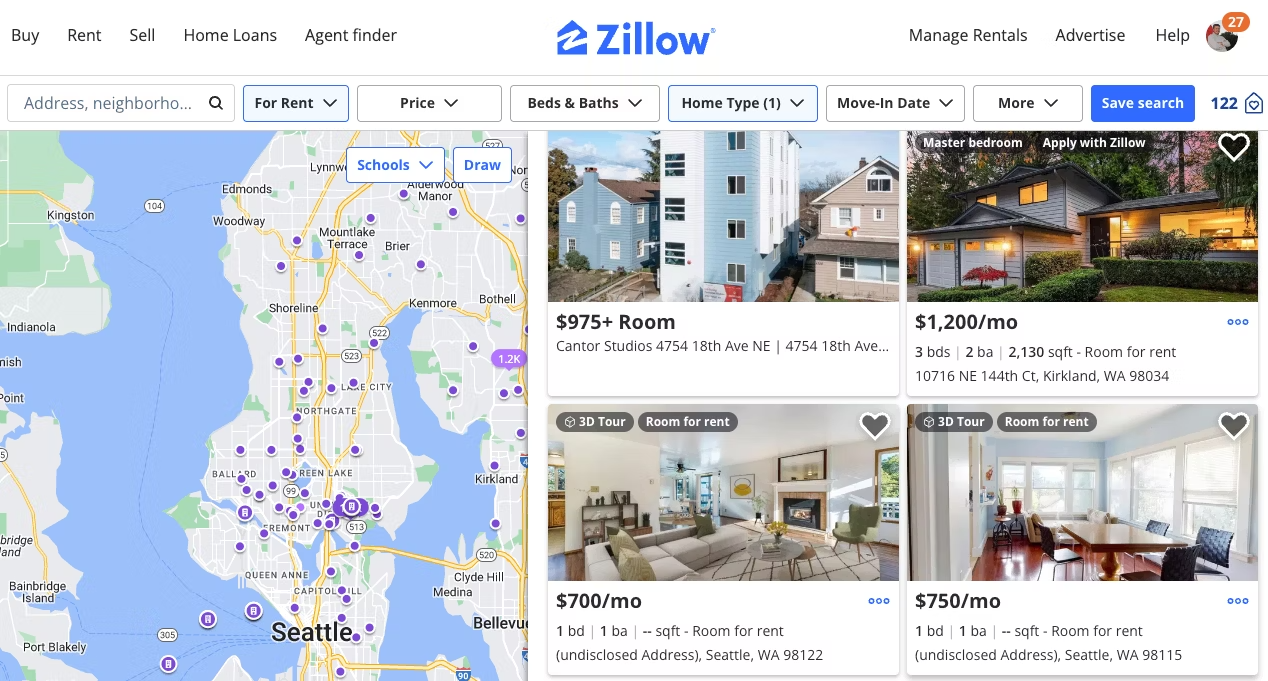The Long and the Short of Zillbnb (Transmission #281)

Curious? Additional examples.
Proptech's Leader has Been Crashing Our Couch the Whole Time // Stock in Down Payments // Banking Real Estate in the Clouds
As always, links surrounded by the ❇️ emoji indicate exclusive GEM Diamond content. If you would like to have access to all links, please consider GEM Diamond membership.
The blending of short and long-term rentals took a gigantic step forward with Zillow’s announcement that homeowners can now list rooms for rent, rather than just entire properties. In search results, renters “can now include ‘room’ listings…alongside traditional ‘entire place’ options” in order to better serve “those seeking shared living spaces in an increasingly expensive market.” Rooms will also appear on HotPads, but are not supported by Trulia.
Zillow's room listing feature is beneficial not only for renters, but also for homeowners, providing an opportunity to reduce mortgage expenses and enhance their financial stability. By listing available bedrooms, homeowners can create new income streams, which may be especially valuable in unpredictable markets. For landlords, this flexibility allows for more dynamic property management, offering single-room rentals as a quick vacancy solution.
Product work is still needed. Seattle listings seem focused on the property as a whole, not the individual room. Photos are a big part of that. Property details pages are cluttered, with the real meat buried below the fold in the description section.
Compare that to Airbnb, where results align more closely with what a renter most cares about: the room. This makes sense given Airbnb’s core host segment when it started was those with rooms, couches, and air mattresses to rent. It’s not surprising they’ve figured a few things out in their decade-plus of existence.
Bungalow is among those property managers already using Zillow to advertise rooms (example). It’ll be interesting to watch inventory grow, and see the split between individual hosts and co-living operators.
Craigslist is still the elephant in the room for room rentals. However, more (safe) options allowing property owners to find renters for unused bedrooms, mother-in-law units, and ADUs can only be a good thing for the affordability woes facing the country.
MANIFESTING ZILLBNB
Packy McCormick from Not Boring previously outlined the strategic advantages of a Zillow and Airbnb merger in a piece titled Zillowbnb. As a former Zillowite turned home-sharing startup founder (and now investor with MyPlace), I’ve been thinking about this for years. He beat me to the punch by putting it to digital paper.
It turns out, Zillbnb already exists as a simple landing page created by Dryfter. This is a pure domain grab; I suspect Dryfter will offload the domain in the next twelve months to a player who takes a real stab at it, like Zillow or Airbnb.
The thing is, Zillbnb doesn’t work as just a website. The power is the combined strategic strength of Zillow and Airbnb. It would make Zillow’s entry into international markets exponentially easier, and provide property managers with a way to fill unused time with short- or mid-range tenants. Meanwhile, Airbnb gains the ability to monetize hosts keen to lessen their workload (or comply with increasingly strict local laws) by renting long-term—without having to build a new audience of long-term renters. And the combined dataset would make Zillow untouchable for estimating property values that factor in the cross of short-, mid-, and long-term rents.
While a merger of two of the top proptech players is unlikely, crazier things have happened. And the fact that Zillow now supports the concept of rooms makes it slightly more likely. Airbnb will go long before Zillow goes short.
❇️I’m still enamored❇️ with the prospect of a “for sale” marketplace overlaid on Airbnb’s inventory. Another area of innovation is ownership of rooms in a shared house. Imagine if you could buy into an HOA of sorts that manages the property, and you own the actual four walls of the room. We’re a few years away from the likes of Ownify, Acre, Fleq, and others rendering buying houses brick-by-brick commonplace. Once that happens, it’s not a stretch that existing property owners choose to sell rather than rent a portion of their unused space.
